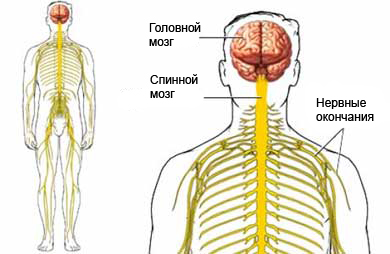Guillain Barre syndrome – Ostraya autoimmunnaya neuropathy – Acute polyradiculitis
Description of Guillain-Barre syndrome
Guillain-Barre syndrome is a rare disease, in which the immune system attacks the nerves outside the brain and spinal cord. It is characterized by numbness,, pricking, weakness or paralysis of the legs, hands, respiratory muscles, and persons. The disease can occur regardless of age.

Causes of Guillain-Barre syndrome
The exact cause of Guillain-Barre syndrome, unknown. But, about 70% patients, perenecli recent infection or surgery. Most likely these reasons and cause an autoimmune response. The immune system “attacks” on the peripheral ganglia, which leads to weakness and sensory loss.
Risk factors for Guillain-Barre syndrome
Factors, which increase the risk of Guillain-Barre syndrome:
- Age: 15-35 and 60-75 years;
- In men, the risk of the disease is more likely, than in women;
- Recent gastrointestinal or respiratory infection by viruses or bacteria;
- A recent vaccination (especially against influenza and meningococcus);
- The flu shot, made in the period 1976-1977 gg. It was seen cases of Guillain-Barre syndrome. (Since then, the vaccine against the influenza virus have been associated only a few cases of Guillain-Barre syndrome);
- Recent surgery;
- The following diseases: lymphoma, lupus, or AIDS.
Symptoms of Guillain-Barre syndrome
Initial symptoms of Guillain-Barre syndrome, include:
- Pain (back pain are usually the first manifestation of the disease);
- Progressive muscle weakness in both legs, hands and face;
- Injections, tingling, usually in the feet or hands;
- The loss of normal reflexes.
Symptoms may develop over a period of hours, days or weeks. They will vary in severity from minimal to total paralysis including airway. Throughout the development of the disease symptoms are deteriorating. Most people experience the greatest weakness in the second or third week.
Complications include:
- Weakness of the face;
- Instability of blood pressure;
- Changes in heart rhythm;
- Cardiac arrhythmias;
- Urinary / gastrointestinal disorders;
- Difficulty breathing.
Most patients recover completely, but 25% have some residual effects, 5% -10% have a permanent deviation. In 5% the disease is fatal.
Diagnosis of Guillain-Barre syndrome
The diagnosis depends on medical examination, Analysis of cerebrospinal fluid, and nerve conduction studies.
For accurate diagnosis is usually done a lumbar puncture. For this purpose the needle is inserted into the lower part of the back, to take a sample of cerebrospinal fluid. If you were found to have high levels of protein, and there is no infection, a sign of the possible presence of Guillain-Barre syndrome. Also carried out a study elektrodiagnostichekoe, to check the electrical conductivity of peripheral nerves and differentiate Guillain-Barré from other disorders with similar symptoms.
Treatment of Guillain-Barre syndrome
Treatment is aimed at reducing the body's autoimmune response and decrease complications. Hospitalization is important, because symptoms may rapidly become more severe, including exacerbation of respiratory failure, cardiac arrhythmias, and unstable blood pressure. Most patients have to stay in the hospital for some time. Common treatments include:
Plasmapheresis
During plasmapheresis, Blood is removed and the body passes through the apparatus, that separates blood cells from plasma. Cells were then returned to the body with the new plasma. This procedure may help shorten the course of treatment and complications of Guillain-Barre syndrome.
High doses of immunoglobulin
Intravenous infusion of immunoglobulin (VVYH) can help reduce the severity of Guillain-Barre syndrome. Immunoglobulins are proteins, It is naturally produced by the immune system of the organism.
Mechanical ventilation
IN 30% cases, the muscles needed for breathing paralysis. This requires treatment with artificial ventilation support.
Decrease pain
Your doctor may prescribe pain medication. These may include non-steroidal anti-inflammatory drugs, gabapentin, Carbamazepine, or narcotic analgesics.
When the diagnosis of Guillain-Barre syndrome, you need to follow your doctor's instructions.
Prevention
To date, there is no way to reduce the likelihood of disease Guillain-Barre syndrome.
